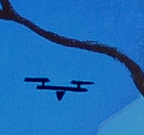What On Earth Is Science Fiction?
If there are no robots, killer AIs, time travel or spaceships in a novel, is it even SciFi?
Margaret Atwood caused controversy a few years back by claiming scifi was just “talking squids in outer space” and only speculative fiction (presumably like “Handmaid’s Tale”) was true literature.
Isaac Asimov reckoned science fiction could be defined as any “literature which deals with the reaction of human beings to changes in science and technology.” Notice the father of robots and space and time-spanning empires didn’t mention them — the content of the story wasn’t part of his definition.
Heinlein had a subtly different, and far stricter, criterion: “realistic speculation about possible future events, based solidly on adequate knowledge of the real world, past and present, and on a thorough understanding of the nature and significance of the scientific method.” His rule is a tough one. Presumably, no faster-than-light travel would be admitted by him, which would mean most space-based stuff would, ironically, get an SF thumbs down.
In the 1960s the definition of SF moved on. Frank Herbert’s Dune (1965) involves mental powers and there’s nothing in the scientific method about those.
Meanwhile, in a separate evolutionary branch, HG Wells and Ursula Le Guin (another serial Hugo and Nebula award winner) wrote books such as “The Time Machine” that cheerfully ignored the scientific method in order to create handy societies that would provide insight into current social issues. Le Guin herself said that science fiction is speculative fiction when what is written about could really happen, whereas narratives that cannot, under any circumstances, happen in our world classify separately as fantasy. Under her regiment, Star Trek would count as fantasy with its warp technology as much as Games of Thrones with its dragons.
According to US author and editor Lester del Rey, “Even the devoted aficionado has a hard time trying to explain what science fiction is,” and Damon Knight claimed “science fiction is what we point to when we say it,” which echoes the famous US Supreme Court definition of pornography as, “I know it when I see it.”
But what do you reckon? Join the discussion in the Gravitational substack newsletter.
Anne Currie is the author of the Panopticon SciFi (or is it?) series, available on Amazon from 99p
Image by JD Hancock
